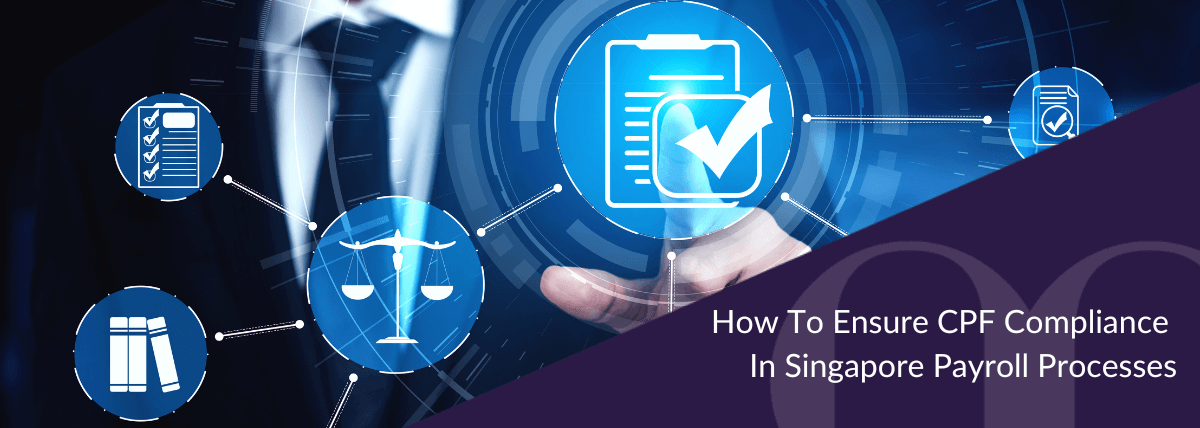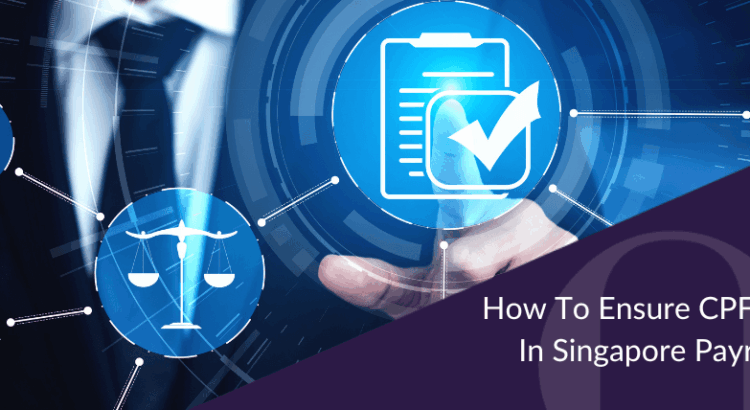The Central Provident Fund (CPF). is a key component of Singapore’s payroll system, ensuring employees’ financial security by supporting long-term financial well-being, covering their future needs such as retirement, housing and healthcare.
For businesses in Singapore, accurate and compliant CPF processing is not just a payroll function, it’s a legal obligation. Non-compliance with CPF regulations can lead to significant penalties, audits, legal consequences, and reputational damage. That is why proper CPF management is essential for every employer. From applying the correct CPF contribution rates in Singapore, to maintaining precise records, every step matters. Ensuring CPF compliance not only helps protect your business reputation but also supports smooth and sustainable operations.
This article explores common CPF payroll challenges and provides practical steps to help businesses stay compliant and efficient. It also highlights how our payroll services can ensure accurate CPF reporting, giving employers and greater peace of mind.
Common CPF Compliance Issues
Miscalculating CPF Rates
A common issue in CPF payroll processing is the use of incorrect contribution rates. In Singapore, CPF rates vary based on an employee’s age group, citizenship status, and total wages. Applying the wrong rate, whether for the employer or employee portion, can result in back payments, fines, and potential audit complications.
Miscalculations often arise from bonuses (treated as Additional Wages and subject to AW ceiling), the CPF Ordinary Wage ceiling, or allowances that may or may not be CPF-liable. Incorrect calculations not only affect compliance but also impact your employee’s take-home pay and long-term CPF savings for retirement, housing, and healthcare, leading to dissatisfaction and compliance risk.
Late CPF Payments
Employers in Singapore are required to make CPF contributions by the 14th of each month. Missing this deadline can result in late payment interest, fines, or even enforcement actions from the CPF Board. Repeated delays may trigger audits and negatively impact your company’s regulatory standing.
For more details, visit the official CPF contribution page: CPF contributions by the 14th of each month .
Inadequate Record-Keeping
Poor documentation of CPF payroll records is another common compliance pitfall. Businesses must retain payroll and CPF records for at least a period of five years. If your payroll documents are incomplete or inaccurate, proving compliance during an audit becomes far more difficult.
Tips on How to Stay CPF Compliant
Understand CPF Rates and Guidelines
Understanding Singapore’s CPF contribution rates is essential for accurate payroll processing. These rates change based on an employee’s age and other eligibility criteria. For instance, employees aged 55 and above may have reduced contribution rates, while newly granted Permanent Residents follows a graduated contribution schedule over two years.
Staying updated on CPF rate changes help ensures accurate contributions and prevents issues such as underpayment or overpayment, which could lead to compliance risks.
Automate CPF Payroll Processes
Manual CPF payroll calculations leave room for human error. Instead, automate processes using compliant payroll systems or work with a trusted payroll provider. These solutions help ensure CPF contributions are calculated accurately, submitted on time, and properly recorded.
Outsourcing CPF management to experts like BoardRoom can help your business remain fully compliant while reducing administrative overhead. Learn more about how our Ignite payroll system supports efficient, automated CPF payroll management.
Categorise Employees Correctly
Not all employees are CPF-eligible. For instance, foreign employees on Employment Passes are not required to make CPF contributions. In contrast, Permanent Residents and Singapore Citizens are subject to CPF deductions at different rates depending on various factors.
Properly identifying employee types ensures the correct application of CPF payroll rules and eliminates common compliance mistakes.
Track and Set Internal Payroll Deadlines
While the CPF payment deadline is the 14th of every month, the best practice is to set internal cut-off dates earlier. If the 14th falls on a weekend or public holiday, payments must be submitted by the previous working day.
Establishing a clear payroll calendar and workflow helps your HR team avoid last-minute submissions and late penalties.

The Importance of CPF Payroll Accuracy
CPF compliance is more than a formality; it ensures your employees’ long-term welfare and protects your business from fines and legal action.
Getting it right means understanding how to manage:
- Contribution ceilings and caps
- Ordinary Wage (OW) and Additional Wage (AW) definitions
- CPF reliefs and exemptions
- Voluntary contributions (for specific cases)
Accurate CPF payroll practices also promote trust among employees, who rely on timely contributions for their retirement, housing, and medical needs.
How BoardRoom Can Help Support CPF Management
BoardRoom offers end-to-end payroll services designed to ensure smooth CPF compliance across your organisation in Singapore. Our expert team handles everything from payroll processing to CPF submissions, ensuring every contribution is accurate, timely, and audit-ready.
Here is how we help:
- Local Expertise: We stay up to date with all CPF rate changes and CPF Board regulations, so you do not have to.
- Seamless CPF Payroll Processing: We calculate and file your contributions precisely and on time.
- Customised CPF Management: Our services adapt to your business structure and workforce composition, whether you are managing a local team or a mix of locals and foreigners.
- Data Accuracy & Security: Our secure digital systems track CPF contributions and payroll records to ensure full compliance and confidentiality.
By outsourcing payroll processing such as CPF management to BoardRoom, your HR team can focus on strategic tasks instead of worrying about compliance risk.
Getting CPF Compliance Right from Day One
CPF compliance is a key part of responsible employment practice in Singapore. From understanding the applicable CPF rate in Singapore, to managing monthly employee CPF contributions accurately, it is important to treat the CPF payroll with the same level of seriousness as other tax and statutory obligations.
Whether you are a small business or a large enterprise, proper CPF management is the key to avoiding penalties, supporting employee trust, and running a smooth payroll operation.
BoardRoom is here to simplify the process. With 50 years of payroll experience in Singapore and the wider APAC region, we help businesses like yours ensure accurate, compliant, and efficient CPF payroll every month.
Talk to BoardRoom today to learn how we can take the complexity out of CPF compliance for your organisation.

